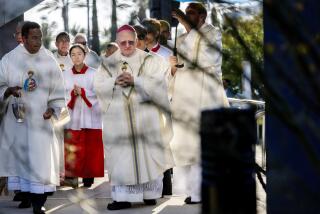Worldwide Christian Body Divided Over Funds, Power
- Share via
A worldwide Christian fellowship credited with winning thousands of businessmen over to speaking in tongues, visions, healing and other Pentecostal beliefs has become bitterly divided over allegations of mishandled funds and countercharges that power is being usurped from the organization’s founder.
At the center of the struggle is Demos Shakarian, 75, the millionaire founder-president of the embattled Full Gospel Business Men’s Fellowship International, based in Costa Mesa.
“We are right on the brink of a split,” said Shakarian in his first extensive interview since the conflict began in May, 1987.
A group of board members then asked Shakarian, who had suffered a stroke in 1984, to remove himself from administrative duties, but he declined in the face of what he called a power struggle by certain board members. He in turn tried unsuccessfully to fire the controller.
Last year, the board’s audit committee notified the Internal Revenue Service that money spent for Shakarian from 1981 to 1987 was $276,000 higher than reported previously, said Gerald Walker, the fellowship treasurer and chairman of the audit committee. The total includes $168,119 in allegedly unauthorized insurance, legal and disability-related costs, and $107,916 in travel and entertainment expenses said to lack documentation.
‘Protect Nonprofit Status’
“We just wanted to make sure that our organization was not doing anything illegal and that we would protect our nonprofit status,” Walker said.
However, Shakarian and his supporters contend that board authorization can be demonstrated for Shakarian’s inclusion in a life insurance plan and his employment of an assistant. Shakarian’s left arm and leg were left paralyzed by his stroke. Mark Bellinger, a Shakarian friend, said he can now account for all but about $6,000 of the $107,000 in travel and entertainment expenses. Shakarian conceded that he had not kept the kinds of records required by the IRS.
“But what’s my time worth? I contributed millions over the years. And I’ve never taken a dime in salary in the 37 years I’ve headed this organization,” said Shakarian, who lives in Downey. In fact, he turned down a $60,000 yearly salary offered by the board in October, 1987.
Shakarian was a well-to-do dairy farmer when he started the fellowship in 1952 at a downtown Los Angeles cafeteria. In a pattern followed by the other chapters, men told how God helped them overcome personal problems--stories that purported to show supernatural events occurring in everyday life.
He made Pentecostal beliefs acceptable to growing numbers of business and professional men at a time when that exuberant wing of Christianity was mostly associated with tiny churches, uneducated preachers and members low on the socioeconomic scale.
‘Could Avoid Stigma’
“By having his nondenominational meetings in hotels and restaurants, a Methodist or other men in mainline churches could avoid the stigma of going to a Pentecostal church building,” said Gary B. McGee, co-editor of the recently published Dictionary of Pentecostal and Charismatic Movements.
McGee said the fellowship’s peak of influence appeared to be in the 1960s and early 1970s, but subsequently “charismatic renewal” groups were tolerated in both mainline Protestant and Catholic churches and the fellowship lost its uniqueness in that sense.
The fellowship, although it has upped its presence to 96 countries, has long since dropped an internationally broadcast TV show and has declined in other numbers. Its monthly magazine, Voice, was once mailed to 800,000 readers but now has a circulation of 275,000. Membership has declined about 10,000 since 1986 to 33,300.
Income was about $6.5 million in 1986, but fellowship officials said receipts will probably be below $4 million for 1988.
A fellowship official who wanted to remain anonymous said sale of the 10-year-old headquarters building is being considered. The $5-million structure is on the opposite side of the San Diego Freeway from the South Coast Plaza shopping center.
Attacks Board’s Moves
That prospect has enraged R. Gene Scalf of Cerritos, a chapter president and son-in-law of Shakarian. In a series of letters to about 2,800 leaders in the fellowship, Scalf has attacked moves by board members to limit Shakarian’s administrative authority and demand that he reimburse the fellowship expenses that the board’s audit committee said were unauthorized.
An apparent reconciliation had been reached at the last world convention in Toronto in July when Shakarian was reelected president and a candidate favored by Shakarian--Gene Ellerbee, a Proctor & Gamble executive--was elected executive vice president. However, Ellerbee is Shakarian’s only ally on the board’s 15-man executive committee, said spokesmen for both sides.
In an angry letter dated Nov. 11 to board member Walter Moore of Arnold, Mo., Scalf noted that he has been convinced from the start that members of the executive committee “were functioning as carnal business men running a secular corporation--it was their nature to climb the ‘corporate ladder’ to seek power and position and to play company politics.”
The “evil spirits in those men who have violated our trust and have become rebellious against God’s appointed leader (Shakarian) and God’s anointed plan,” Scalf wrote.
Employees Dismissed
Houston builder Norman Norwood, a Shakarian opponent on the board who was executive vice president for a year before Ellerbee’s election, said he fired four or five employees at the Costa Mesa headquarters in an effort to help save a declining ministry.
“I tried to put some stability in it, but the family wanted to take it back over,” Norwood told the Houston Chronicle recently. Referring to Shakarian, he added, “When you have a fellow who’s a founder of a thing and it’s religious, people look to him as a kind of deity.”
Both sides hope to gain ground in a meeting of the American and international boards of the fellowship Jan. 27 through 29 in Palm Springs.
Shakarian and Scalf said they believe the 140-member international board, which was incorporated in 1953, is split down the middle in allegiance. Scalf said he hopes the international board will agree to abolish the recently formed U.S. corporation, to prohibit any executive committee member from any leadership position, to fire controller Peter Taylor and to absolve Shakarian of any financial wrongdoing.
A statement released last month in the name of the executive committee said that some expenditures “appeared to require documentation,” but that there was “no evidence that there was any intentional misrepresentation, collusion or attempt to obtain special financial favor or gain by its international president, Demos Shakarian. . . .”
Walker, the treasurer and a retired Denver businessman, disputed that the statement reflected the entire executive committee’s views. “Only two or three people worked on that ctatement,” Walker contended.
To Make Recommendations
In Palm Springs, Walker said his audit committee will make its final recommendations and that any further action will be up to the directors.
The boards are also expected to consider conflicting charges that the headquarters building has been “bugged” with an electronic listening device. Both sides are convinced the other has been privy to their secrets in the strained atmosphere of the headquarters building. Walker said a firm that checked the building found evidence of electronic surveillance but not the equipment itself.
Walker acknowledged that Scalf and others have garnered strong sympathy for Shakarian from the membership, but “I don’t know why the boards would do a turnaround.”
Shakarian did not rule out the possibility that he would leave the organization. “A lot of men are encouraging me to step out and start a new organization, but as a shepherd I’d hate to do that. That would be as a last resort.”
Demos Shakarian
*Millionaire founder- president of Full Gospel Business Men’s Fellowship International, based in Costa Mesa.
*Well-to-do dairy farmer when he started fellowship in 1952 at a downtown Los Angeles cafeteria.
FULL GOSPEL BUSINESS MEN’S FELLOWSHIP INTERNATIONAL
*Peak influence appeared to be in the 1960s and early 1970s.
*Presence in 96 countries.
*Membership has declined about 10,000 since 1986 to 33,300.
*Income was about $6.5 million in 1986, but receipts may be below $4 million for 1988.
*Internationally broadcast TV show began in the 1970s and shown in 150 cities, now dropped.
*Monthly magazine, Voice, once was mailed to 800,000 readers but now has a circulation of 275,000.
More to Read
Sign up for Essential California
The most important California stories and recommendations in your inbox every morning.
You may occasionally receive promotional content from the Los Angeles Times.













